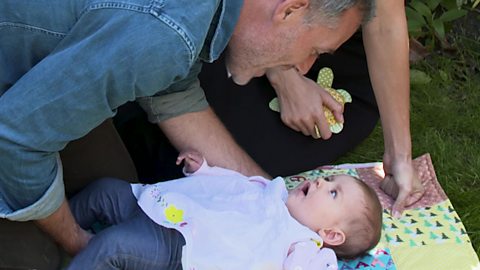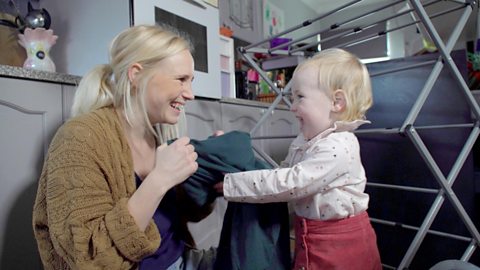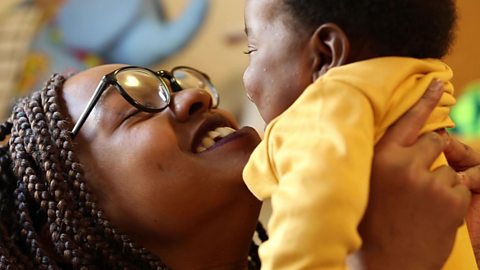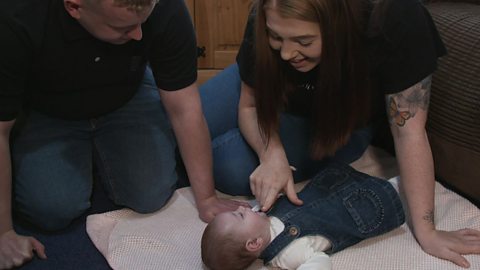Does singing Wheels on the Bus in a busy playgroup make you feel slightly (OK, very) awkward? Or do you cringe at the thought of babbling back to your baby in a supermarket queue?
As a new parent, you might feel uncertain about how to talk to your baby. However, as Gemma Hunt, a presenter on the CBeebies show Swashbuckle says, this is not something to worry about: "You may not have been around children before you had your own, so don’t be too hard on yourself if talking to your baby doesn’t come naturally to you."
The good news is, there are simple tricks and tips you can try to make yourself feel more comfortable – and positive. And if you start early, even before your baby is born, you'll build your confidence gradually.
Here, Gemma – who also works as a children’s entertainer – shares her advice for talking to babies and children… and having fun doing it.

1. Use props
Books, toys, random items in your bag… if you’re not sure how – or what – to say to your little one, then use something visual to get you started.
Gemma says, “Use visual aids like books or magazines or photos on your phone. You can then talk to your baby about what you’re looking at, which can help if you’re feeling self-conscious or don’t know what to say.”
2. Channel your inner child
Another great way to communicate with your baby is by being physical. And that means funny faces, blowing raspberries and anything else that will make your little one giggle.
“Let your inner child come out!" says Gemma. “Use wide eyes, screw up your nose or make funny shapes with your tongue by rolling it up and sticking it out. If it’s a sunny day, make shadow puppets with your hand and talk about patterns and shapes. It’s all about different ways to engage with your child.”

3. Be yourself
Research tell us that using an animated voice with lots of changes of pitch can help babies learn to talk. However, you don’t always have to do silly voices if it makes you feel uncomfortable.
It is more important that you talk to your child and that they hear your voice.
So, why not chat to your baby about anything and everything to get them interested in talking?
4. Get down to your child's level
Worried your baby won’t respond when you talk to them? Gemma suggests getting down to their level to boost that communication.
“I think making eye contact is the most important thing. Get down to their level but not in that typically adult way of slightly bending over with your hands on your knees! Instead, actually crouch down to their level or sit them next to you for a chat.”

5. Sing
If you’re struggling to think of what to talk to your baby about, there’s one thing that’s guaranteed to work: singing.
“Your baby or child honestly won’t care if you sing out of tune,” says Gemma. “They aren’t judging you."
They’ll just love to hear the different pitch of your voice.
If nursery rhymes aren’t your thing, why not sing along to your favourite songs on the radio?
6. Don’t worry about anyone else listening...
… because they won’t be!
Gemma says, “I don’t know why, as adults, we feel so inferior in front of other adults and feel they are judging us. Everybody is so self-absorbed they’ll be too busy focusing on what they are doing rather than what you are saying to your baby.”

7. Don’t overthink it
Talking to your baby can feel a bit one-sided at times. And without your baby talking back, you might start wondering if you’re saying the wrong things. But according to Gemma you should just go with the flow and not worry about it. Your baby or child certainly won’t be…
“Let things go. If you say something to your baby and then feel really self-conscious and embarrassed, you could say, ‘oh that was a bit silly wasn’t it’, then move on. You can guarantee two seconds later they will have moved on to the next thing and forgotten about it.”
8. Chat about your interests
Your baby may be fascinated by messy play and In the Night Garden. But that doesn’t mean you can’t talk to them about things that interest you too.
You still could chat to your little one about your day, or what you’ll all be doing at the weekend and notice things that particularly interest them. No matter what you talk about, one thing is true… “Your baby is the best listener,” says Gemma.






